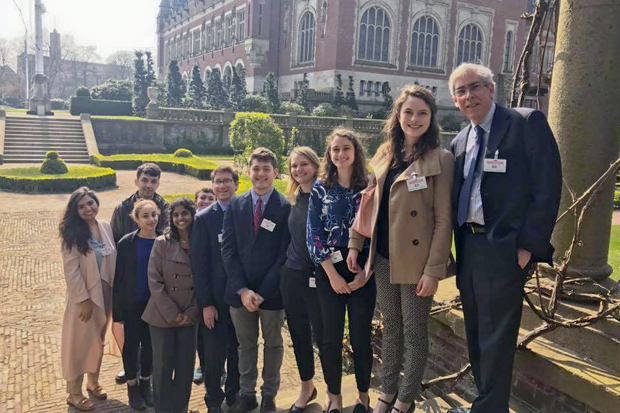International justice: Brandeis students do legal work abroad in The Hague
Students encounter new perspectives in the world's human rights and international law hub.
 Photo/Max Gould
Photo/Max GouldBrandeis students in front of the Peace Palace in The Hague
Trying alleged terrorists in absentia while studying international law might seem like the job of a seasoned legal mind, but Brandeis undergraduates are engaged in such work through the Brandeis in The Hague study abroad program.
American Studies professor Richard Gaskins directs the university’s legal studies program and co-created Brandeis in The Hague in 2010 with International and Global Studies (IGS) and the Office of Study Abroad. He has since taken almost 200 students to the Netherlands for this overseas experience, which is offered in the spring as a semester-long opportunity and as a six-week summer program.
During their time abroad, students live inside residence halls at the University of Leiden, which provides a fresh perspective on what college life is like outside the U.S.
Living quarters are just a 10-minute train ride away from a global hub of law and human rights policy.
“I knew coming into Brandeis that studying abroad was a popular thing to do, but I wasn’t sure if I wanted to do it until I heard about Brandeis in The Hague,” said Max Gould ’18, who is from Maplewood, New Jersey and double-majors in Philosophy and American Studies. “I attended this past spring, and it was an amazing four months.”
Gould, who made the trip to The Hague last semester with nine other Brandeis undergraduates, interned for the Special Tribunal of Lebanon, which was established in 2005 after the assassination of Lebanese Prime Minister Rafic Hariri. When Gould and his peers weren’t inside the trial chamber assisting lawyers sorting out terrorist networks, they were working with tribunal staff and conducting research.
“We were working with the smartest, most accomplished people I’ve ever met,” said Gould. “And even beyond that, there’s uniqueness to the work we did. The Lebanese Tribunal is one of the few worldwide that prosecutes acts of terrorism.”
Students who go to The Hague in the spring must also take courses in international law, human rights and conflict resolution in addition to their internship. Brandeis offers a six-week program in The Hague during June and July, too, though there’s no internship component, as time only allows for students to take courses on international law and conflict resolution.
Gaskins has been the primary instructor, but summer teaching duties are now in the hands of legal studies professor Melissa Stimell. Also teaching in the Spring Semester is professor Gregory Townsend, who lives in The Hague and works as an official at a legal tribunal.
The course curriculum, combined with The Hague’s history as a global hub for international law, gives students a chance to grow intellectually and broaden their scope of the world outside American borders.
“Above all, The Hague is a laboratory for issues of human rights and social justice,” Gaskins said. “It’s a place where you can see how the ideals of global justice play out in reality. Students get a look into dealing with some of the most difficult human conflicts around the world.”
“The Hague is home to the most important international courts, major human rights organizations and hundreds of representatives from around the globe coming together to work on practical solutions to large problems and injustices,” providing students with a unique perspective on the outcomes of international conflict, Gaskins added.
Fatma Siddique ’18, who is from Bayonne, New Jersey and double-majors in politics and international relations, also interned with the Special Tribunal of Lebanon and left The Hague with a deeper appreciation for international law.
“My time in The Hague was amazing, especially with the Tribunal because we got to enter an international court room in full robe and had real responsibilities,” Siddique said. “I’ve always wanted to learn more about international law and this experience gave me more of an incentive to do it.”
Gould is now considering law school and Siddique is thinking about pursuing a career involving human rights and criminal law. Gaskins, who has led Brandeis in The Hague for almost a decade, isn’t surprised by how students come away inspired to amplify their goals and seek out something new.
“From a professor’s standpoint this is the most rewarding thing about teaching, to see the growth of one’s students in so many dimensions; not just background knowledge but self-confidence, ability to ask questions and willingness to collaborate,” Gaskins said. “There is academic and personal growth that takes place during this period abroad, and you really can’t separate the two.”
Categories: General, Humanities and Social Sciences, International Affairs, Student Life





